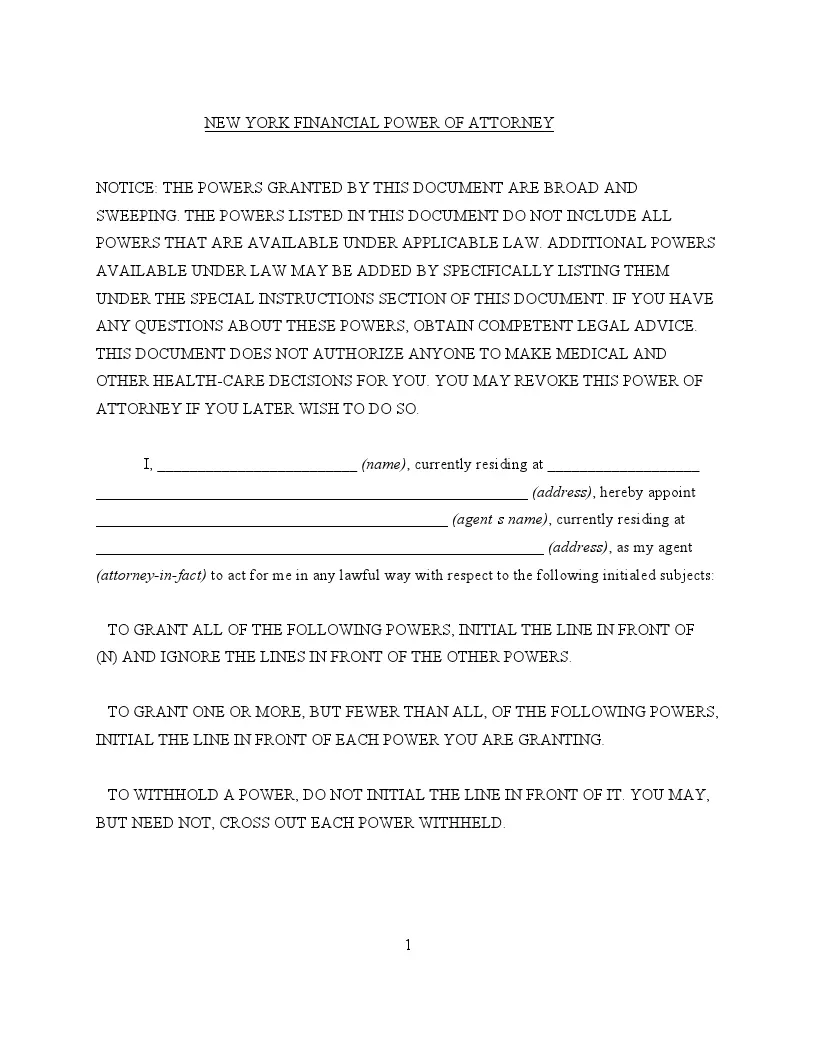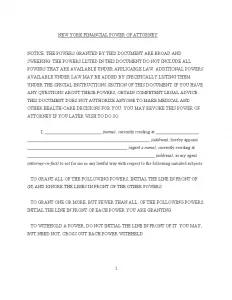New York General Financial Power of Attorney Form
The New York general financial power of attorney is a legal document that grants one person, known as the agent, the authority to act on behalf of another person, called the principal, in a broad range of legal and financial matters. This can include handling financial transactions, managing real estate affairs, and making other legal decisions. However, unlike a durable POA, a general power of attorney is ineffective if the principal becomes incapacitated.
This means the authority granted under this type of power of attorney is extensive but typically ceases if the principal loses the capacity to make their own decisions due to mental or physical disability. It’s often used when the principal expects to be unavailable or unable to manage their affairs for a certain period, such as during extended travel or specific transactions. Because of the significant power the agent will hold, the principal needs to choose a trustworthy and competent agent.
If you need to grant your agent limited powers, consider using other New York power of attorney templates.

Build Your Document
Answer a few simple questions to make your document in minutes
Save and Print
Save progress and finish on any device, download and print anytime
Sign and Use
Your valid, lawyer-approved document is ready
This state’s general power of attorney laws are outlined in the Consolidated Laws of New York, Sections 5-1501 to 5-1514. These statutes outline the creation, execution, and revocation of powers of attorney, ensuring legal clarity and protection for all parties involved. Requirements for valid execution of this document are the following:
- A power of attorney must be signed, initialed, and dated by the principal, who must have the capacity to do so.
- It can alternatively be signed by another individual, not the agent or successor agent, at the principal’s direction and in their presence.
- The signature of the person signing on behalf of the principal must be duly acknowledged in the manner prescribed for real property conveyances.
- The document must be witnessed by two individuals who are neither named as agents in it nor as permissible recipients of gifts.
Revocation of a general power of attorney in New York can be executed either as stipulated in the power of attorney document itself or through a revocation notice delivered to the agent. This can be done in person or by sending a signed and dated notice via mail, courier, electronic transmission, or facsimile to the agent’s last known address.
New York General Power of Attorney Form Details
| Document Name | New York General Power of Attorney Form |
| Other Name | New York Financial Power of Attorney |
| Relevant Laws | Consolidated Laws of New York, Sections 5-1501 to 5-1514 |
| Avg. Time to Fill Out | 10 minutes |
| # of Fillable Fields | 41 |
| Available Formats | Adobe PDF |
Filling Out New York General (Financial) POA Form
Below is a step-by-step guide to filling out a New York general power of attorney form, ensuring your document is valid and effective.
1. Read the Instructions
Before proceeding, thoroughly read the instructions provided on the form. Understanding the implications and responsibilities of creating a general power of attorney is crucial.
2. Designate Your Agent
Identify the person (or persons) you trust to act as your Agent. Write their full name(s) and address(es) in the designated section. Decide whether these agents can act separately or must make decisions together, and initial the appropriate box to indicate your choice.
3. Appoint Successor Agents (Optional)
You may appoint successor agents who will take over if your primary agent is unable to serve. Fill in their names and addresses and specify whether they can act separately or jointly.
4. Specify Effective Date and Termination
Initial the appropriate line to indicate when the general power of attorney will become effective — either immediately or on a specified date. Also, initial the conditions under which the form will terminate, such as a specific date, revocation, or your incapacity.
5. Grant Specific Authorities
Detail the powers you are granting to your agent. These can include real estate transactions, banking, insurance transactions, and more. You must initial next to each specific authority you are granting or provide a comprehensive list if you choose to grant all powers.
6. Add Modifications (Optional)
In the modifications section, you can limit or supplement the powers granted to your agent. This section also allows you to authorize your agent to be compensated or to make specific gifts.
If you want someone to monitor your agent’s activities, name them. Monitors can request documentation from your agent to ensure they act according to your wishes.
7. Sign and Acknowledge
Sign the form in the presence of a notary public and two witnesses not named as agents. The witnesses must also sign the form, acknowledging that they witnessed your signature and that you signed voluntarily.
8. Notarization
The final step is to have your signature officially notarized. Ensure the notary public completes their section, confirming your identity and the voluntary nature of the signing.
